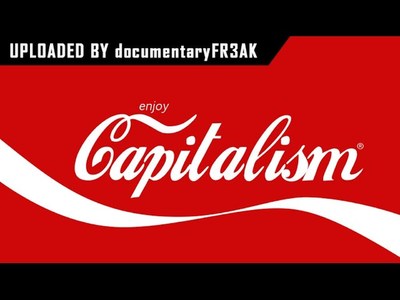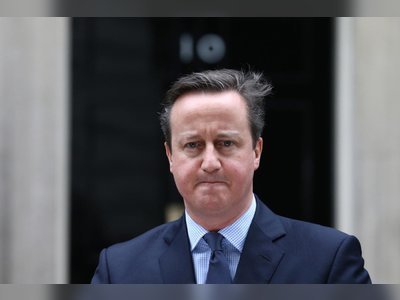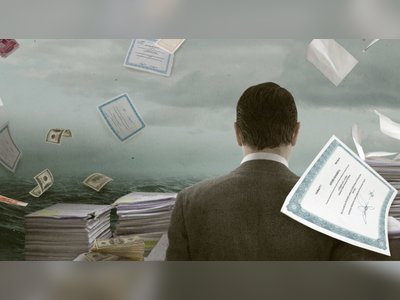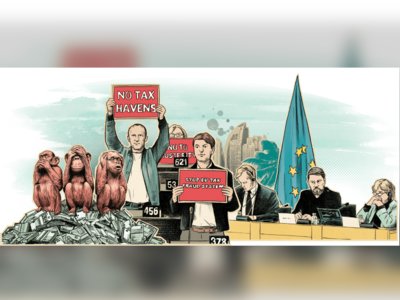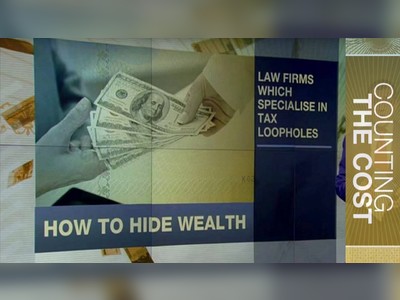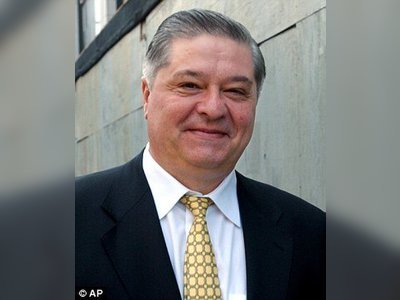The report published by the Guardian on Blairmore Holdings Inc landed on Monday afternoon: David Cameron’s father had run an offshore fund that for three decades avoided paying tax in Britain by hiring a small army of Bahamas residents – including a part-time bishop – to sign its paperwork.
In Downing Street, the initial response was lofty and dismissive. A spokeswoman for the prime minister lazily swatted questions away, referring to a story four years ago that revealed the existence of the investment fund. “Most of you seem to be aware that that story was written in 2012 and we responded at the time. I don’t have anything to add to that,” the spokeswoman said. Asked whether the Cameron family still had any money invested in the fund, she responded: “That is a private matter.”
Not any more, it isn’t. The world now knows all about the Blairmore shares held, quite legally, by Cameron and his wife Samantha, which were finally sold in January 2010. But the wider fallout from a week that began with stonewalling and worked its way to full disclosure via prevarication and partial explanation remains to be seen.
Right now, the starring role of Blairmore in the Panama Papers appears to have dented the credibility of a prime minister who now faces the battle of his political career to ensure the continued membership of the United Kingdom in the European Union.
Yesterday, speaking to the Conservative spring forum, Cameron wryly observed that it was “not a good week”. It was, as he knew, an understatement. Rarely has the “establishment” looked more, well, establishment-like. As thousands of employees at the Port Talbot steel works pleaded for their livelihoods after being left to the mercies of global competition, the Panama Papers revealed the squalid manoeuvres of a monied class devoted to stashing away their cash in sunny places well away from the taxman’s reach. And yet it is the British establishment – most particularly the prime minister – that is asking the country to put their faith in their judgment and stay in the EU.
“This walks straight into every Eurosceptic’s dream,” Matthew Parris, the former Tory MP, wrote in the Times, “Every swivel-eyed populist loon, every crazy Corbynite, every ‘they’re all in it together’ pub bore, will be hugging themselves this weekend. This tax story may be minor, it may be overblown, it may be unfair on David Cameron. But it is very, very dangerous.”
Downing Street’s refusal to discuss Blairmore was never likely to hold in the febrile atmosphere created by the disclosure of the Panama Papers – an unprecedented leak of 11.5 million files from the database of the world’s fourth biggest offshore law firm, Mossack Fonseca, to the German newspaper Süddeutsche Zeitung, which shared them with the International Consortium of Investigative Journalists (ICIJ).
It was on Friday morning – five days after questions first began to be raised about whether the prime minister had ever benefited, or would in future benefit, from the trust set up by his late father Ian – that Cameron and his aides decided he had no option but to give the kind of detail the media was after.
Insiders claim that it was on seeing his father’s picture featuring again and again on the television evening news channels that the prime minister felt he had to try to bring the saga to an end through a frank interview.
Some believe that as attention was also falling on the financial affairs of his chancellor, and favoured successor, it was considered wise to cause a distraction. Whatever the truth, Cameron belatedly thought strategically and decided to take action.
An interview had already been arranged with Robert Peston, the political editor of ITV News, for Friday afternoon, during which the prime minister had planned to talk about the importance to young people of Britain’s continued membership of the EU.
That theme was pushed aside to deal with the questions about Blairmore Holdings Inc, (a shift of emphasis that felt ominous to many Remain campaigners). “Of course I did own stocks and shares in the past – quite naturally, because my father was a stockbroker,” Cameron told Peston.
“I sold them all in 2010, because if I was going to become prime minister I didn’t want anyone to say you have other agendas, vested interests. Samantha and I have a joint account. We owned 5,000 units in Blairmore Investment Trust, which we sold in January 2010. That was worth something like £30,000… I paid income tax on the dividends.”
But if the prime minister thought that the interview would, or could, put an end to the matter, he was wrong. Cameron must account for himself in parliament, insisted Labour. The Labour MP John Mann even called for Cameron’s resignation. Jeremy Corbyn demanded he give a “full account of all his private financial dealings”. Newspapers pored over the finances of the wider Cameron clan, showing to the world just how very different he was from the rest of us.
The images of David and Samantha enjoying a beer during an Easter break in Lanzarote were swiftly overshadowed in the public consciousness by screaming headlines such as at that published in yesterday’s Daily Mail: “Cameron Inc – The father with the £20m property empire, the step-father with a 20,000-acre estate and the mother who founded a £30m company... You thought Dave and Sam were super-rich, now meet the rest of the family!”
Yet more damage limitation was required from a chastened PM. A precedent had to be set. “I know I should have handled this better,” the prime minister told yesterday’s spring forum. “I could have handled this better. I know there are lessons to learn and I will learn them. And don’t blame No 10 Downing Street, or nameless advisers – blame me. And I will learn the lessons.”
Cameron added he had been “very angry about what people were saying about my dad”. “I love my dad. I miss him every day,” he said. “He was a wonderful father and I’m very proud of everything he did.
“But I mustn’t let that cloud the picture. And the facts are these. The facts are I bought shares in a unit trust, shares that are like any other sorts of shares, and paid tax on them in exactly the same way. I sold those shares – in fact, I sold all the shares that I owned on becoming prime minister.
“And later on I’ll be publishing the information that goes into my tax return, not just for this year but for years gone past because I want to be completely transparent and open about these things. I’ll be the first prime minister, the first leader of a major political party, to do that. But I think it’s the right thing to do.”
The published tax figures may finally put this chapter to bed. Many fear, though, that it may be too little, too late.
The Tory MP Mark Pritchard recognises the tactics being deployed by campaigners for the UK to leave the EU. “Some Brexit campaigners do think if you damage Cameron you will also damage the Remain campaign,” he admitted. “[But] it is a rather binary and polarised view of politics, which is thankfully both an inaccurate assessment and one of their strategic weaknesses.”
Maybe. Cameron’s worst critics will admit that his great strength as prime minister has always been that the public finds him convincing, decent, trustworthy, competent. He has consistently polled better than his party and, indeed, anyone in it.
In making the case for EU membership those are precisely the qualities he needs to exude in the weeks ahead, pollsters suggest. Yet he suddenly looks weakened, and, for a time at least, somewhat diminished; which is a problem not just for Conservatives but for all those who want the UK to remain in the European Union.
“This has profound effects on domestic politics in that it is very good news for Jeremy,” one senior Labour MP said last week. “But for those of us who want to stay in the EU and are relying on Cameron to carry the torch, it could be completely bloody fatal.”
At no point was the damage to the prime minister more apparent, perhaps, than on Thursday, during a visit to Exeter University to try to talk young people round to backing EU membership.
Refusing to take questions from the assembled media, who had one thing on their mind, Cameron opened the discussion for questions and a student threw back at him the question of his tax affairs.
“I am very interested in what the collective EU states could do to combat tax avoidance – something you have personal experience of,” the student said with a twinkle in his eye.
The comedian Jimmy Carr, whom Cameron had condemned as “morally wrong” in 2012 for his use of aggressive tax avoidance schemes, tweeted: “I’m going to keep it classy. It would be ‘morally wrong’ and ‘hypocrytical’ [sic] to comment on another individual’s tax affairs.”
Harsh words, and personal attacks, politicians can take. When the public starts to laugh and mock, the rot on a political career may well have set in.
Soon after the publication of the Panama Papers, a YouGov poll published last week suggested an extraordinary turnaround in sentiment among the general public: Cameron’s approval rating had fallen below Corbyn’s for the first time. Just 34% cent of voters had responded that the prime minister was doing a good job, while 58% felt he was not. Only 30% approved of the job Corbyn was doing, but 52% disapproved. On net scores, Corbyn had nudged ahead by one of his whiskers.
Tomorrow, Labour will call for a series of actions to rebuild trust, including a public inquiry into the revelations in the Panama Papers, a change in the register of MPs’ interests to include details that the prime minister had been able to leave out of his records, and a set of minimum standards for crown dependencies and overseas territories.
Next month, Cameron will host an international anti-corruption summit which gives him a much-needed opportunity to take back some high moral ground. The global fallout from the Panama Papers will rumble on for a long time yet. But no other country has quite such a pressing date with destiny as Britain. Former Labour MP Ian Davidson, who is the party’s coordinator for the Vote Leave campaign, believes the most significant impact of last week’s drama could be witnessed on 23 June.
“This is a referendum on Dave’s deal on the EU,” said Davidson, who was MP for Glasgow South West until the general election in 2015. “Cameron came back saying he had achieved something and it all fell apart. It is very much a vote about him and if he loses this referendum he will have to resign.
“It will be the end for Osborne too,” Davidson added. “This is a vote on the future of both of them. Why would you trust a man about the European Union if you can’t trust him on his own tax affairs?”
How the prime minister’s position changed
MONDAY
So, is Cameron family money still invested in Blairmore Holdings, the offshore fund set up by the prime minister’s father, which appears in the Panama Papers?
“That is a private matter”
says a spokeswoman for David Cameron
TUESDAY
The media persist. Pressed by Sky News’s Faisal IslamCameron begins to open up.
“I have no shares, no offshore trusts, no offshore funds, nothing like that. And so that, I think, is a very clear description”
Not quite clear enough, though. Downing Street issues a statement later that day:
“To be clear, the prime minister, his wife and their children do not benefit from any offshore funds. The prime minister owns no shares. As has been previously reported, Mrs Cameron owns a small number of shares connected to her father’s land, which she declares on her tax return”
WEDNESDAY
Cameron’s spokesman issues a further clarification which raises an obvious question.
“There are no offshore funds/trusts which the prime minister, Mrs Cameron or their children will benefit from in the future”
Did they benefit in the past, though?
THURSDAY
Cameron tells the full story to Robert Peston of ITV News:
“We owned 5,000 units in Blairmore Investment Trust, which we sold in January 2010”
The shares were sold for £31,500.
SATURDAY
Addressing the Tories’ spring forum, the prime minister admits it has
“not been a great week”
He goes on to take full responsibility for a week of botched answers and explanations:
“I know that I should have handled this better, I could have handled this better.
“I know there are lessons to learn and I will learn them.
“And don’t blame No 10 Downing Street or nameless advisers, blame me. And I will learn the lessons”



